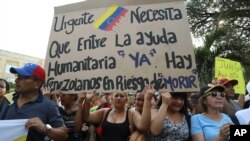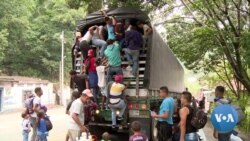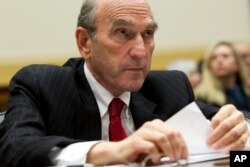The U.S. Congress will not approve military intervention in Venezuela, House Foreign Affairs Committee Chairman Eliot Engel said Wednesday.
“I do worry about the president’s saber-rattling, his hints that U.S. military intervention remains an option. I want to make it clear to our witnesses and to anyone else watching: U.S. military intervention is not an option,” Engel said at a hearing on the political and economic crisis in the once-stable South American country.
U.S. President Donald Trump was among the first of 51 world leaders to recognize the head of the nation’s national assembly, Juan Guaido, as the interim president. Guaido assumed power following mass protests accusing incumbent President Nicolas Maduro of rigging last year’s elections in his favor. Trump said in a televised interview Sunday that U.S. military intervention is “an option.”
WATCH: Elections, Not US Military Needed in Venezuela, Lawmakers Say
Food, supply shortages
Venezuela suffers from the worst inflation rate in the world, along with food and supply shortages. Three million refugees — about 10 percent of the country’s population — have fled the country.
In testimony before the House Foreign Affairs Committee, administration officials told lawmakers the United States was researching all options to get aid to the Venezuelan people.
The administration’s special representative to Venezuela, former Reagan and Bush administration official Elliott Abrams, said U.S. sanctions against the Maduro regime were working. Abrams also refused to rule out the possibility of U.S. military intervention.
Democratic lawmakers question Abrams’s credibility to serve as the U.S. representative in the region, citing the convictions he received — and eventually was pardoned — for his role in the Iran-Contra affair in the 1980s.
Abrams told lawmakers the solution to Venezuela’s political crisis was ultimately not up to the United States.
“It’s not for us to choose the next president of Venezuela. It’s for Venezuelans. We can help, as a lot of other countries can help, in facilitating a free election,” he said.







